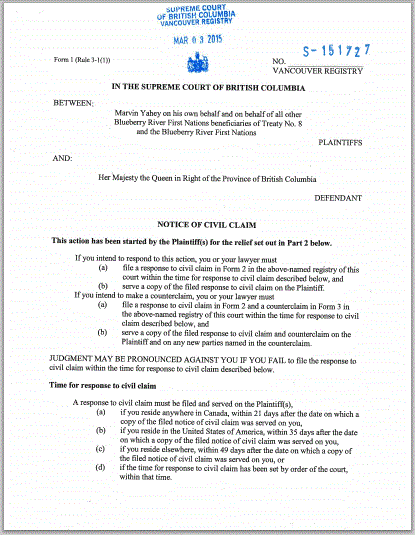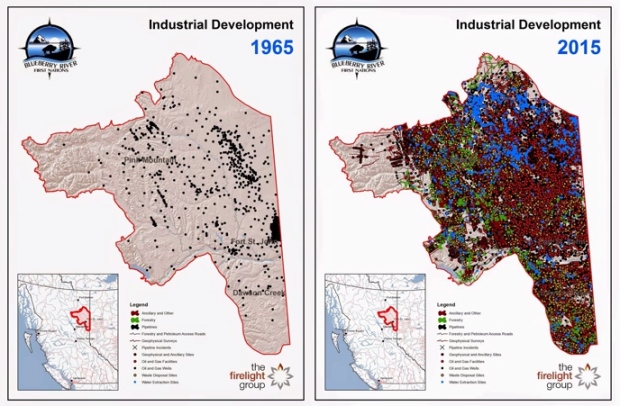B.C. First Nation suit alleges development projects — including $8.8B dam — violate treaty rights by Canadian Press, National Post, March 4, 2015, Calgary Herald
A British Columbia First Nation has launched a lawsuit alleging its treaty rights have been violated by decades of development — a legal challenge that could affect the province’s planned Site C hydroelectric dam project, as well as the expansion of mineral, oil and gas extraction in the province’s north.
The lawsuit, filed in B.C. Supreme Court by the Blueberry River First Nations, follows several recent court decisions involving aboriginal rights, including a landmark Supreme Court of Canada last year that expanded how much influence First Nations can exert over development.
The Blueberry River band’s lawsuit argues the cumulative effect of development in its traditional territory has harmed its way of life in violation of Treaty 8, which was ratified in 1900.
“There are vast dark zones in our territory where we are no longer able to practise our treaty rights,” Chief Marvin Yahey told a news conference Wednesday. He said oil and gas wells, pipelines and clearcuts had changed the land so much it would be unrecognizable to the band’s ancestors and that development continued to shrink the group’s territory at a rapid pace.
The band’s traditional territory includes the proposed location of the Site C hydroelectric dam, an $8.8-billion project approved last year that the provincial government says will generate 1,100 megawatts of electricity.
Construction is scheduled to start on Site C project in June, but it’s one of the developments the band wants halted.
The statement of claim contends the band’s lands and its rights to hunt and fish have been eroded cumulatively over multiple decades, something other Treaty 8 bands have not argued in court before.
John Rich, the group’s lawyer, said the band tried for twenty years to address its concerns by negotiating with the province but without success or progress. He said the lawsuit was a last resort.
“The Blueberry River First Nations’ back is against the wall,” said Rich. “They are suing to get a remedy from the courts that they have not been able to get through negotiation.”
None of the allegations have been tested in court.
The provincial government did not make anyone available for an interview.
In an emailed statement, Aboriginal Relations and Reconciliation Minister John Rustad described the lawsuit as “unfortunate,” and he said the government had negotiated development with all Treaty 8 First Nations, including Blueberry River.
Other northeastern B.C. First Nations covered by Treaty 8 have used the courts to slow down or stop the building of the Site C dam, requesting that environmental approvals or decisions be overturned because of inadequate consultation.
The Blueberry River lawsuit and previously filed cases related to Site C follow a string of court decisions that have redefined First Nations’ rights when it comes to development projects in their territories.
The most significant case was released by the Supreme Court of Canada last year, when the high court granted B.C.’s Tsilhqot’in people title to 1,750 square kilometres of land.
Gordon Christie, who specializes in aboriginal law at the University of British Columbia, said last year’s Supreme Court of Canada decision isn’t directly related to the current because, unlike the Blueberry River band, the Tsilhqot’in did not have an existing treaty. Most of B.C.’s First Nations bands never signed treaties with the government.
Still, Christie said the Tsilhqot’in decision could affect the Blueberry River case later on. “These are things that will get argued, probably, if this gets into court,” said Christie, who directs the university’s indigenous legal studies program. He said there had been “lots of litigation” since 2004 from First Nations aimed at getting them a greater say in development and resource decisions and policy. Christie estimated there had been hundreds of cases, but he said most First Nations had limited resources for long legal struggles, making the courts “a very uneven playing field.” [Emphasis added]
Blueberry River First Nations lawsuit threatens Site C, fracking in B.C., Suit alleges government violated Treaty 8 rights with cumulative impacts of oil and gas development by CBC News, March 4, 2015
The Blueberry River First Nations have launched a legal battle that could affect B.C.’s planned Site C hydroelectric dam, as well as oil and gas development both inside and outside the band’s territory.
The B.C. First Nation has filed a lawsuit in B.C. Supreme Court that alleges years of development, including mining, forestry and oil and gas projects, have violated its treaty rights under Treaty 8.
 The lawsuit: Marvin Yahey, Blueberry River First Nations v British Columbia
The lawsuit: Marvin Yahey, Blueberry River First Nations v British Columbia
“The province is not abiding by our treaty rights that were given to us back in 1900,” said Chief Marvin Yahey of the Blueberry River First Nations.
The band has raised concerns about hydraulic fracturing – or fracking – for natural gas in their territory for more than a decade, but the B.C. government hasn’t listened, said Yahey.
He said Blueberry River First Nations want the Site C dam and other projects slowed to provide time for consultation, which he called “disappointing” to date. “There has always been talk, yes, but never a meaningful consultation to address our concerns,” said Yahey.
The area the band claims as its traditional territory is located in northeastern B.C. and includes the city of Fort St. John and the location of the proposed Site C dam.
It’s also the area that has seen rapid development in the natural gas sector.
Yahey said only a “very small” percentage of Blueberry River First Nations’ 470 band members make a living in the industry.
B.C. government calls lawsuit ‘unfortunate’
In a statement, the B.C. government said it is “committed to consulting with Blueberry River First Nations and all Treaty 8 First Nations” on decisions that affect their hunting, fishing and trapping treaty rights. [“committed to” means nothing; it does not mean consulting. Commit is an oil and gas industry loved escape hatch word]
“We remain committed to reaching a respectful, long-term government-to-government relationship,” said Aboriginal Relations and Reconciliation Minister John Rustad in a statement. [“remain committed to” means even less than “committed to”]
He said he had been meeting with Chief Yahey and the Blueberry River First Nations.
“It’s unfortunate Blueberry River has chosen the path of litigation,” wrote Rustad.
The Blueberry River First Nations are alleging that more than 90 per cent of their territory has been disrupted by development. [Emphasis added]
Click here for maps comparing industrial activity today to 50 years ago.
Sweeping aboriginal lawsuit threatens to strangle resource development in northeastern B.C. by Mark Hume, March 4, 2015, The Globe and Mail
Development in British Columbia’s resource-rich northeast sector, where the massive Site C dam is planned and gas exploration is booming, could be halted by a lawsuit that has been filed against the provincial government.
The Blueberry River First Nations announced Wednesday that they are suing the government for breaching Treaty 8, a document enacted in 1900 that promised natives that in exchange for opening their lands to settlement they could continue their traditional way of life.
Blueberry River First Nations – Industrial Development Change Over Time
The Blueberry are now claiming in B.C. Supreme Court that the development of hydro dams, the burgeoning oil and gas industry, forestry, mining, agriculture and road building have largely destroyed their ability to hunt, trap, fish and gather plants as they traditionally did.
The Blueberry bands are seeking (PDF) a declaration from the courts that in permitting the cumulative impacts of industrial developments the B.C. government breached its treaty obligations. The bands are also seeking an interim injunction restraining the government from permitting any further development.
The Site C dam on the Peace River is an $8.8-billion project. Oil and gas development in B.C. has been undergoing phenomenal growth, with an estimated $6-billion spent annually on exploration and development, most of that in the northeast. The Montney field alone contains an estimated 271 trillion cubic feet of marketable natural gas.
Although specific resource projects have often been challenged by First Nations in the past, the Blueberry suit is believed to be the first case that is based on the cumulative impact of numerous developments. In a statement, Chief Marvin Yahey said when Treaty 8 was signed members of the Blueberry bands thought that they would be able to continue to live in their traditional ways.
But that is no longer possible, he said, because of a steady stream of development.
“Blueberry’s ancestors would not recognize our territory today. It is covered by oil and gas wells, roads, pipelines, mines, clear cuts, hydro and seismic lines, private land holdings, and waste disposal sites, amongst other things,” said Chief Yahey. “The pace and scale of development have accelerated in the last 25 years, and are now at unprecedented levels.”
He said Blueberry members can’t meaningfully practice their way of life.
“It is the cumulative impact of the thousands of provincially authorized activities, from water withdrawals, to major industrial projects such as the Site C dam, which have destroyed our way of life and threatened our continued existence as a people,” said Chief Yahey. “This is a grave situation that the province continues to ignore. We fear things will only get worse with the LNG ‘gold rush’ we are witnessing in our territory today.”
The Blueberry River First Nations live in the northeast corner of the province, near Fort St. John, where oil and gas exploration is booming. The recently approved Site C dam project would flood a section of the Peace River Valley where native bands have traditionally hunted, fished and trapped for thousands of year.
The notice of civil claim was filed by Chief Yahey and the Blueberry River First Nations on Wednesday. The government has not yet had a chance to file a response. [Emphasis added]

